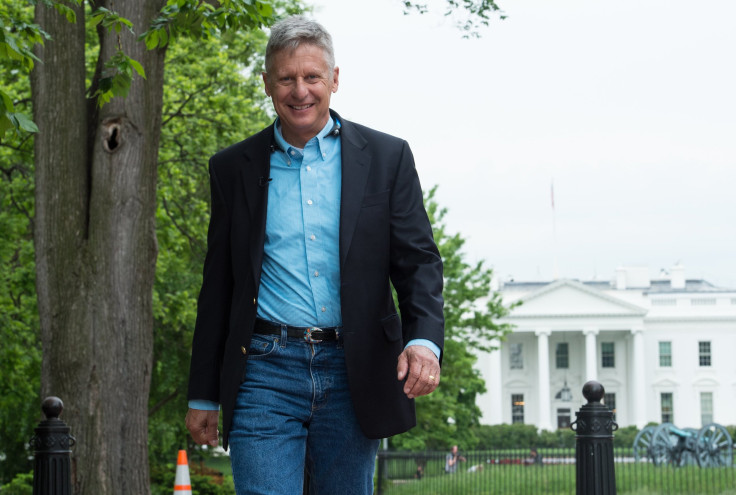Elections 2016: Libertarian Convention Sees Renewed Interest Amid Low Popularity For Clinton And Trump

UPDATE: 8:30 p.m. EDT — The Libertarian Party formally selected former Massachusetts Gov. William Weld to be the running mate of presidential candidate and former New Mexico Gov. Gary Johnson Sunday in Orlando, Florida. Weld, 70, has been criticized for only recently joining the party, but nabbed the nomination after getting 51 percent support during the second round of voting, the Huffington Post reported.
Weld reassured attendees Sunday that he was a Libertarian for life — and he thought their ticket had a good shot at gaining serious momentum heading into November. "Someone doesn't have to be disaffected with Ms. Clinton to think that we have a good story," CNN reported Weld said. "One doesn't have to be Never Trump to see that we were two of the most fiscally conservative governors in the United States."
Original story:
For many years the Libertarian Party has been of interest to relatively few U.S. voters. Drawing support from certain free market capitalists and marijuana aficionados, it has only several hundred thousand registered members, accounting for a fraction of the adult population. But that may change in an increasingly tight 2016 presidential race as many voters struggle to choose between two likely nominees who have some of the lowest popularity ratings in recent history.
“There are Republican voters who are going to feel cheated by the fact that their presidential nomination has been taken by a reality show star, and there are Democratic voters who are going to feel cheated when that corporate shill boxes out [Vermont] Senator [Bernie] Sanders at the convention in that rigged process,” Nicholas Sarwark, the Libertarian Party’s national chairman, said Sunday. “When those people feel cheated, we present an option for them.”
Both the likely Republican and Democratic nominees, businessman Donald Trump and former Secretary of State Hillary Clinton, respectively, have suffered from low popularity ratings in recent polls. Hard-line conservatives accuse Trump of being a demagogue who has hijacked the party, while many liberals are lukewarm on Clinton, wary of her connections to Wall Street and her ties to the political elite.
A whopping 58 percent of U.S. adults recently surveyed by the Wall Street Journal said they held an unfavorable opinion of Trump, and Clinton wasn’t far behind with a 54 percent negative rating. In a veritable litmus test of popularity, more people responded that they had a “very negative” view of the candidates than they did of Russian President Vladimir Putin. The margin of error for the May 15-19 survey of 1,000 registered voters was 3.1 percent.
In this race of “the lesser of two evils,” as Sanders, who has pledged to stay in the Democratic primary campaign until the last vote is counted, defined it in a recent interview, the Libertarian Party has found a niche. Loosely defined as socially liberal and economically conservative, the party’s core values are free market capitalism and individual freedom. Libertarians tend to take more progressive views on certain issues than many mainstream Republicans, frequently supporting marijuana legalization, for instance. Unlike many Republicans, they are also more likely to support an isolationist foreign policy.
At the party’s convention in Orlando, former New Mexico Gov. Gary Johnson was chosen Sunday as the presidential pick, winning 55.8 percent of the vote. With a platform of limited central government and marijuana legalization, the former governor has said he will support former Massachusetts Gov. Bill Weld as his running mate. Weld has already come under fire from party members, however, as he joined the Libertarians just weeks ago and is accused of being “Republican-lite.”
Johnson ran on the Libertarian ticket in 2012, racking up 1.2 million votes. (By comparison, President Barack Obama garnered nearly 66 million votes to nearly 61 million for Republican Mitt Romney.) While the number is relatively high for a third party candidate, his supporters still accounted for less than 1 percent of total votes cast.
The former governor has looked to pick up votes from young progressives who support Sanders and conservative Republicans who see Trump as an outsider. His main obstacles in the coming months will be to raise nearly $1 billion to support his campaign — he raised approximately $347,000 from January to April, the Hill reported. He’ll also need to show he is supported by at least 15 percent of voters polled to make it onto the debate stage. Despite these challenges, Johnson was optimistic at the convention.
“There is a real possibility we can achieve major party status!” he said in his acceptance speech Sunday.
© Copyright IBTimes 2024. All rights reserved.





















